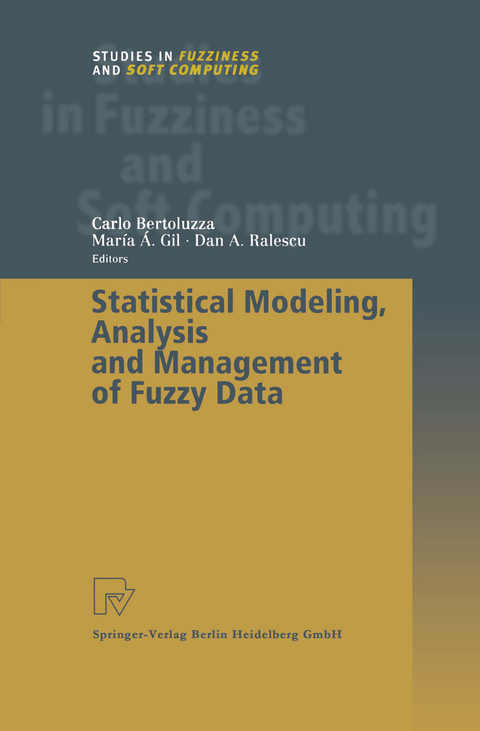
Statistical Modeling, Analysis and Management of Fuzzy Data
Physica (Verlag)
9783790825015 (ISBN)
1. Fuzziness and Randomness.- Fuzziness and randomness.- 2. Fuzzy-Valued Random Elements.- On the variance of random fuzzy variables.- f-inequality indices for fuzzy random variables.- Traditional techniques to prove some limit theorems for fuzzy random variables.- Convergence in graph for fuzzy valued martingales and smartingales.- Remarks on Korovkin-type approximation of fuzzy random variables.- Several notions of differentiability for fuzzy set-valued mappings.- 3. Possibility, Probability and Fuzzy Measures.- Average level of a fuzzy set.- Second order possibility measure induced by a fuzzy random variable.- Measure extension from meet-systems and falling measures representation.- The structure of fuzzy measure families induced by upper and lower probabilities.- Statistical classes and fuzzy set theoretical classification of probability distributions.- 4. Statistics and Fuzzy Data Analysis.- Statistics with one-dimensional fuzzy data.- Testing fuzzy hypotheses with vague data.- Possibilistic interpretation of fuzzy statistical tests.- Possibilistic regression analysis.- Linear regression in a fuzzy context. The least square method.- Linear regression with random fuzzy observations.
| Erscheint lt. Verlag | 21.10.2010 |
|---|---|
| Reihe/Serie | Studies in Fuzziness and Soft Computing |
| Zusatzinfo | XIV, 309 p. |
| Verlagsort | Heidelberg |
| Sprache | englisch |
| Maße | 155 x 235 mm |
| Gewicht | 489 g |
| Themenwelt | Mathematik / Informatik ► Mathematik ► Computerprogramme / Computeralgebra |
| Mathematik / Informatik ► Mathematik ► Statistik | |
| Mathematik / Informatik ► Mathematik ► Wahrscheinlichkeit / Kombinatorik | |
| Schlagworte | Artificial Intelligence • Calculus • Data Analysis • extension • Fuzziness • Fuzzy Data • Fuzzy Logic • Fuzzy Measures • Fuzzy Perception • Fuzzy Random Variables • Fuzzy Set • linear regression • Modeling • perception • Probability Distribution • Probability Theory • Random Variable • set theory • Statistics • Variance |
| ISBN-13 | 9783790825015 / 9783790825015 |
| Zustand | Neuware |
| Informationen gemäß Produktsicherheitsverordnung (GPSR) | |
| Haben Sie eine Frage zum Produkt? |
aus dem Bereich


